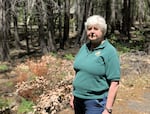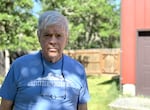Most people take for granted having a fire department available to protect their home in case of a disaster. But one part of Josephine County hasn’t had a taxpayer-funded fire department for decades. That creates gaps in protection for local residents.

Dorothy Yetter lives in unincorporated Josephine County and has long advocated for the creation of a rural fire district.
Erik Neumann
Near her house outside of Grants Pass, Dorothy Yetter walks through dry brush and trees on her 40-acre property.
“You could see how all of this could provide nice fuel for a forest fire,” Yetter says, dry branches crunching underfoot.
Yetter lives in unincorporated Josephine County. Despite the rural feel of wooded communities like hers, around 35,000 people live in this part of the county. Even as the population has grown, over the years residents have voted down one proposal after another to create a tax-funded fire department.
According to Yetter, that creates a range of problems when it comes to fire protection, from lacking safety standards to slower emergency response times, to residents essentially subsidizing their neighbors who don’t pay for fire protection. Yetter says creating a tax-funded district would fix this problem.
“I think people have to understand that if you pay the tax, you will get that back in services,” she says.
In the absence of a tax-funded fire district, several private fire companies have filled the gap to protect local homes. About 70% of residents pay for subscription fire protection in unincorporated Josephine County with the cost varying based on the value of a house. Yetter pays $354 per year for her property.
NO REGULATION, NO OVERSIGHT
Nearby, off of Williams Highway, radios crackle inside one of the stations of Rural Metro Fire. Department Operations Chief Austin Prince says this area is unique.

Rural Metro Fire Department Operations Chief Austin Prince says a fire district would allow for improved firefighter safety in rural Josephine County.
Erik Neumann
“You have this fairly large chunk of ground inside this county of Josephine County, 350 square miles roughly, with no regulation or oversight,” Prince says.
Private fire companies like Rural Metro, which Yetter subscribes to, aren’t required to follow standards for safety, training or equipment when putting out house fires.
“If you don’t have any of that to follow, which nobody’s requiring you to do that, you’re just out there, Billy Bob and his water truck, showing up at your house,” Prince says.
Even Prince, who works for this private fire company, says the county needs to pass a tax-funded fire district. He says the current model puts firefighter safety at risk.
“I worry about the folks that show up from another company, that’s outside of the command and control structure,” he says. “They might drive into an area that’s going to get them injured, or they might block our ability to get in to save somebody, or we might be in a situation where we have to get out and they’re blocking us from getting out.”
Rural Metro Fire voluntarily follows a set of fire department safety standards from the Rogue Valley Fire Chiefs Association. Their local competitor in the area, County Fire Department, has not met those basic standards, Prince says.
There is a set of standards listed on the County Fire website, but they appear to have been copied from a municipality in Connecticut, which Prince says are not relevant to rural Josephine County. The document repeatedly references place names and local statutes from outside Oregon. Representatives from County Fire did not respond to phone or email interview requests.
A RANGE OF PROBLEMS
Other residents are exasperated with trying to get a local fire district passed by voters.
“I was somewhere between stunned and appalled by what I discovered when I came here,” says John Maupin, a retired wildland fire chief who has campaigned for a fire district.

Retired wildland fire chief John Maupin who has advocated for a rural fire district.
Erik Neumann
He says without this tax structure, the region isn’t eligible for as many grants for extra fire protection equipment, fuel reduction around homes, or training. He says the stakes of not sufficiently funding a fire district are high for all kinds of services.
“That means it takes longer to get to fires, heart attacks, traffic accidents, extractions and that results in more pain and suffering and the incidents getting worse,” Maupin says.
There’s also a fairness issue, he says. Right now about 30% of residents in this unincorporated area don’t have fire protection subscriptions. But Rural Metro Fire will still try to help if their house catches on fire.
“There’s a huge subsidy going on and these people are basically getting a free ride,” he says.
Essentially, Maupin says, a minority of residents are getting the benefit of the fire companies and everyone else is getting overall worse fire protection than if the region had a district.
LACK OF COMMUNITY SUPPORT
Why this issue has persisted for so long is often blamed on the Josephine County commissioners. Commissioner Herman Baertschiger was opposed to the most recent tax proposal to create a fire district. He says the proposed property tax rate of $1.74 per $1,000 was too high and residents would never support it.
“It’s the money. It’s always the money. How much?” Baertschiger says. “That’s why the money part of the equation has to be driven by the community or the community votes it down.”

Josephine County Commissioner Herman Baertschiger speaking at a wildfire townhall in Grants Pass in 2022.
Erik Neumann
The proposal failed during the May, 2021 special election by 6%, with about a third of residents in the unincorporated region casting votes.
Some local critics accuse Baertschiger of not advocating strongly enough for the creation of a fire district. Or they say he’s intentionally undermined efforts to form one. Baertschiger owns property in the unincorporated area and would be affected by a tax, according to property records.
The three Josephine County commissioners could pass a district themselves. But Baertschiger says that’s a bad idea because voters could turn around and undo that plan.
“They could go out and they could, through the petition process, get their signatures and they could overturn the decision of the commissioners,” he says.
Baertschiger has made some efforts to start a fire district. As a state legislator in 2019, he helped get $1.5 million in state funding appropriated to Josephine County as start-up funds to form a rural fire protection district. But without the go-ahead from the community, the majority of those funds remain unspent in a restricted county fund, according to staff.
INDIVIDUAL OR COMMUNITY RESPONSIBILITY?
Surveying the woods outside of her house, Dorothy Yetter says one of the problems with this rural part of the county is that residents believe they can do everything themselves.
“They forgot that they’re in a community. No matter how much acreage you have, you still have neighbors that you need to communicate with, support, and do things together,” Yetter says.
But after a record-breaking fire season in Oregon in 2020, the Josephine County commissioners did the opposite. They passed a resolution stating that the county has no responsibility when it comes to putting out house fires in the unincorporated area and that it’s up to residents to protect themselves.

